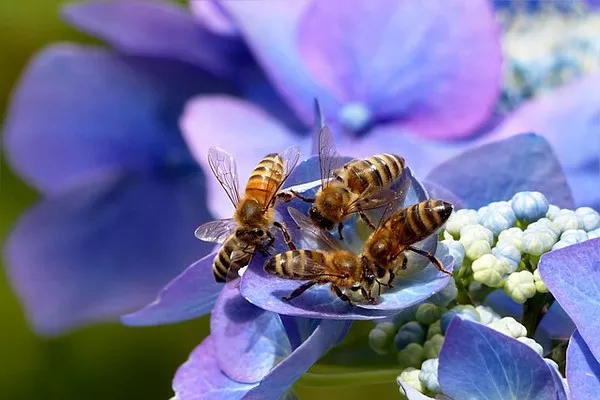In a unique effort to enhance our understanding of bees’ behavior and secure their survival, researchers in Europe are turning to these vital pollinators. Bees, often overlooked in the grand tapestry of wildlife tracking, play a critical role in our ecosystem. They pollinate 80% of all flowering plants, including over 130 types of fruits and vegetables, contributing up to €550 billion annually to global food production.
A research project funded by the European Union, called BEE-MOVE, is at the forefront of this endeavor. Dr. Mathieu Lihoreau, a behavioral ecologist at the University of Toulouse, leads the project, which aims to gain insights into bees’ foraging behavior and interactions with the environment. To achieve this, the project uses radar technology to track the movements of bees as they navigate fields with robotic flowers, ultimately improving crop pollination, conserving wild bee populations, and protecting rare plant species.
Bees’ behaviors, including navigation, decision-making, and memory, are essential to their role as pollinators. They play a crucial part in the reproduction of plants by carrying pollen from one flower to another, enabling the production of fruits and vegetables. Bees are known to exhibit complex behaviors, including the ability to detect electric fields and count, and they can even experience emotions and doubts.
While previous research involved tracking individual bees using large and expensive harmonic radars, BEE-MOVE employs a groundbreaking radar that tracks bees without the need for antennas. This radar uses technology similar to car reverse sensors, emitting energy waves to detect objects by bouncing off them. According to Lihoreau, this innovative radar is the first of its kind to be used in ecology.
By monitoring the movements of honeybees and bumblebees as they visit robotic flowers, BEE-MOVE seeks to uncover the rules that govern their foraging behavior, promoting a better understanding of bee behavior in both solitary and group settings. Additionally, the project aims to investigate the impact of contaminants, such as pesticides, on bee behavior when added to the sugar water offered as a reward to the bees.
Pesticides, including insecticides, have been a known threat to bee populations. These chemicals are often neurotoxins that can interfere with bees’ navigation systems, affecting their ability to forage and contribute to crop pollination. The European Food Safety Authority has highlighted the dangers of neonicotinoid insecticides to wild bees and honeybees.
In parallel, another EU-funded project, iPollinate, is working on enhancing hive sensors. These sensors, equipped with artificial intelligence and placed on beehives, provide real-time data on honeybee foraging. The data helps orchard owners determine the healthiest bee colonies and optimize hive placement and orientation, thereby improving pollination and fruit crop yields. iPollinate aims to build a prototype of its sensor system by the end of 2023, with plans to make the service available to commercial partners in 2024.
Both projects, BEE-MOVE and iPollinate, underline the critical connection between bees and the ecosystem, emphasizing the urgent need to address biodiversity loss resulting from human influences like pollution. Bees, as frontline defenders in the ecological crisis, warrant attention and protection for the sake of our environment, agriculture, and food security.
By studying and understanding the behavior of these remarkable pollinators, researchers hope to contribute to bee conservation, enhance crop pollination, and ultimately create more resilient ecosystems.


